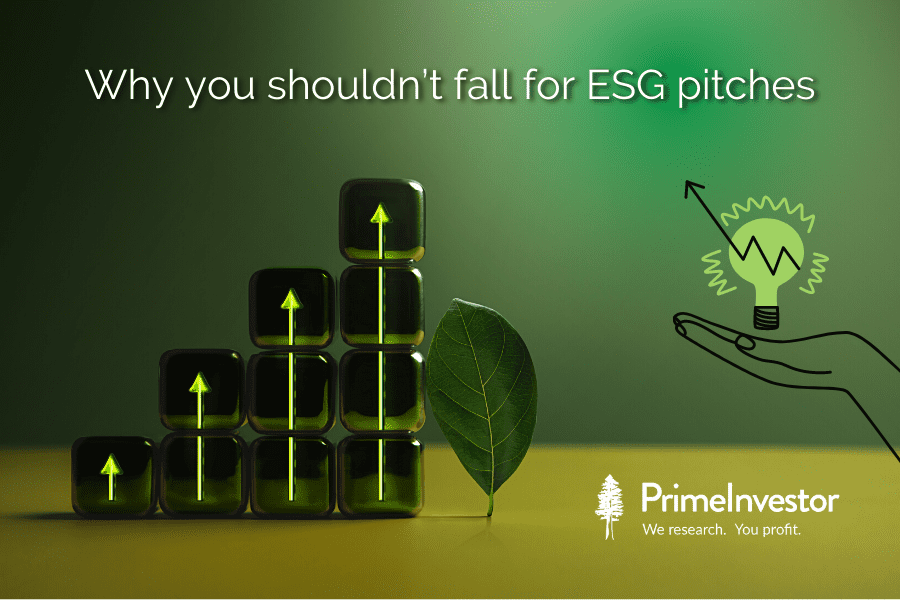“Why are the so-called expert investors in India so disinterested in ESG funds?”. A young investor asked me this question at a recent event and it gave me food for thought. It is true that at PrimeInvestor, we are not fans of ESG investing either. We don’t go out of our way to cover ESG funds or ‘green’ bonds and deposits, unless they offer great returns.
But it isn’t just seasoned Indian investors who are sceptical of ESG investing. In 2021, when CalPERs pressured Berkshire Hathaway to disclose more information on workplace diversity and its approach to climate change, Buffett termed the idea as ‘asinine’ and ‘bureaucratic’. Berkshire is known to own companies making sugary confections and oil drillers. NYU Stern professor Aswath Damodaran recently called ESG ‘the most oversold and over-hyped concept in the history of business’.
Could it just be that grizzled folks on the wrong side of 50 don’t need to worry about the future of the planet as young investors obviously do? This is a valid doubt. But even socially conscious young investors should be wary of ESG pitches for very logical reasons. See if we can convince you.

Your values aren’t my values
If you are keen to consider ESG in your investing decisions, you obviously have one primary objective. You want to make sure that your money is being used for furthering good causes or ethically sound businesses. But can there really be a universal definition of what a ‘good cause’ is?
Moral values vary a lot between one person and the next. I may think of liquor and gambling as all-right businesses while shunning tobacco, while you may believe all three are evil as they further addiction. A 20-year old’s ideal of an ESG company may be one that offers equal opportunities to LGBTQ folks. But a person in his fifties may think that an ESG company is one that offers solid healthcare benefits and a pension plan to its retirees.
Forget such nuances. Opinions may even differ on whether a business is actually arresting or actively contributing to climate change! Elon Musk fans will tell you with fanatic fervour how Tesla is a forerunner in the mission to transition the world to zero-carbon emission. But Musk haters will point out that rising EV use may actually add to carbon emissions if the underlying electricity is produced from fossil fuel. Most professional ESG managers bet heavily on technology companies such as Apple because they have a low carbon footprint. But recent protests at Foxconn’s Chinese facilities brought to light the very dubious worker policies at this dominant supplier of Apple products.
Therefore, companies that score high on E may slip up on S and G. Companies that are laser-focused on shareholders (G) may give the environment or society the short shrift. As an ESG investor, deciding on what mix of E, S and G you want and actually finding it in an investment, is a tall ask.
Fuzzy methods
To woo socially conscious folks, ESG money managers put out posh presentations showcasing the ‘proprietory’ methodology that they use in screening stocks for Environmental, Social and Governance (ESG) factors. This may make you believe that there is a great degree of science that goes into deciding if a company is doing all that is right by the environment, society and its shareholders.
But the truth is that the methodology used by money managers to screen ESG candidates is quite fuzzy. Though stock exchanges have now gotten into the act in offering ESG indices and rating agencies score companies on ESG parameters, these agencies do not have any standard norms on how they score firms on ESG issues.
Global ESG proponents were in a tizzy in May this year after S&P booted out Tesla but retained Exxon Mobil in its widely tracked S&P 500 ESG Index. The explanation it offered was that its ESG scores for companies are assigned based on their comparison to peers within the sector. While Exxon ranked high on ESG among energy companies, Tesla didn’t fare as well compared to its old-world peers on ESG disclosures! (Read S&P’s justification here)
If universal norms on what constitutes an ESG-compliant company are still fluid in the US where trillions of dollars in assets are pouring into ESG funds, you can only imagine the nascent state the concept is in India, where the idea is in its infancy. A SEBI study on Indian ESG funds (Rs 12,000 crore in assets) in 2021 showed that these funds used divergent methods to fulfil their ESG mandates.
Some fulfilled it by avoiding companies that are overtly anti-society or anti-environment (like tobacco or coal miners). Some actively hunted for companies that create favourable ESG impact. Some used both fundamental factors and ESG scores to build portfolios, while others filtered for ESG alone. Given that thematic funds in India need to invest only 80% of their portfolios in the stated theme, some funds also took liberties with non-ESG holdings. One ESG fund had significant weights in Adani group stocks that helped drive outperformance, though they don’t figure as big weights in the Nifty ESG Index.
If you examine the portfolio of the Nifty 100 ESG Index, you’ll find that it has heavier weights in IT and financial stocks. But the top holdings in this index aren’t very different from those on any other normal diversified fund. The below stocks are what you can expect to own if you own any suitably large flexicap fund in India. The fact that the Nifty100 ESG Fund’s returns carry a 0.98 correlation with the Nifty50 should tell you that there’s really nothing very distinct or special about ESG portfolios.
The other big challenge for investors in ESG funds is their restricted investment universe. To cull out data on a company’s ESG credentials, Indian money managers use data from their BRSR disclosures (Business Responsibility and Sustainability Reporting) mandated by SEBI or from the rating agencies who assign ESG scores. BRSR reporting, until recently, was mandatory only for the top 500 listed companies. Rating agency ESG scores are available for about 200 companies. There may be small or mid-sized companies outside of these that are doing society or the environment a lot of good. But investors will miss out on them due to the lack of disclosures or ESG scores.
Greenwashing
With many large global pension funds, sovereign wealth funds and institutions chanting the ESG mantra, the ESG tag is fast becoming a sought-after one even for the not-very-socially-conscious companies. This has given birth to the problem of ‘greenwashing’ – where companies make exaggerated claims about their impact on social, environmental or governance issues without actually walking the talk.
With over $55 trillion of global money under professional management expected to have an ESG mandate in 2022, most large companies worldwide are racing to get on the buy lists of ESG-conscious investors by adding a green veneer to their disclosures and annual reports. But many companies making tall (and difficult to verify) claims about their social or environmental impact have actually been found to be quite lax in these respects. A recent report from a corporate accountability non-profit argued that many of the global tech giants, who figure prominently in ESG funds, aren’t making the required progress on zero emissions under the Paris Agreement.
This has led to regulators in the EU, UK and US now setting very stringent criteria on who can be labelled as ESG-compliant or ‘green’. The EU has been actively reviewing and stripping many so-called ESG and green investments of their labelling after finding evidence of pervasive ‘greenwashing’.
Doubtful return claims in ESG investing
To sell the idea of ESG investing to fence-sitters, money managers try to show that funds constructed based on ESG mandates also deliver a superior return. These return numbers are most often obtained by massaging the data to show favourable point-to-point returns. In reality, there are some periods when plain vanilla portfolios outperform ESG portfolios and some when the situation is reversed. The table below shows the Nifty 100 ESG Index outperforming the Nifty 100 over 5 years but trailing it quite significantly in the last one year and YTD basis.
In the world of investing, when one idea garners too much attention and money, valuations usually go to over-the-top stocks belonging to that idea or theme. This has happened with ESG investing too. In the past year, global investors, realising that the so-called ESG compliant technology and financial companies had been bid up to very expensive valuations have course-corrected. ‘Anti-ESG’ bets on coal mining, oil and gas etc have thus outperformed.
A good alternative
All this not to say that you, as young investors, shouldn’t believe in social causes or strive for a better future for the planet. We would only advocate that, instead of entrusting the job of achieving social impact or furthering good causes to money managers or companies, it would be best for you to directly give to causes that are close to your heart.
Despite his cynicism about ESG, Buffett is among the most generous philanthropists in the world, as he has already pledged to give away 99% of his wealth to social causes identified by him. All of us can emulate this practice. We can shoot for nothing but wealth creation in our investment portfolios. Once we create wealth, we can use it to further the environmental, social or governance causes that are really dear to us.







3 thoughts on “Why you shouldn’t fall for ESG pitches”
My thoughts exactly. ESG for me is wokeism meeting investing and that does not go well!!
Very well written. Simple act of carrying a cloth bag (to replace polythene carry bag) can achieve greater results than ESG investing to achieve social impacts.
Wonderfully written ! Ideas are crisp and clear!
Comments are closed.